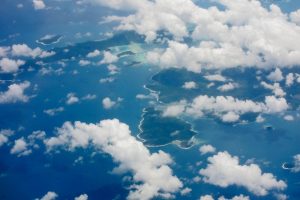The past week has brought news about the activity of Chinese ships around the Natuna Islands, in particular, the presence of the Chinese destroyer Kunming 172 inside Indonesia’s Exclusive Economic Zone (EEZ). According to local media reports Indonesian fishermen reported the presence of the Chinese vessel and other ships. This came after a Chinese survey ship escorted by China Coast Guard vessels was spotted last month sailing in the waters of the North Natuna Sea, as the Indonesian government refers to the waters around the Natuna islands.
Given that the Chinese survey ship continues to lurk in the waters around the Natuna Islands, the Indonesian government must respond to the presence of Chinese ships in its 200-nautical-mile EEZ by making approaches through diplomatic channels and taking other constructive steps to protect the country’s national interests, including the security of Indonesian citizens who are carrying out economic activities in the Indonesian EEZ.
Around the Natuna Islands, Indonesia has a territorial sea, a contiguous zone, and an EEZ in accordance with the United Nations Convention on the Law of the Sea (UNCLOS). According to the convention, Indonesia only has sovereignty over the waters of the territorial sea and the inland sea that exists between the islands.
Under UNCLOS, the territorial sea extends 12 nautical miles from the coastline, while the additional (contiguous) zone extends a further 12 nautical miles. The EEZ, meanwhile, extends a further 176 nautical miles from the edge of the contiguous zone – or 200 nautical miles from the coastline.
These three sea regimes grant Indonesia different rights. In the territorial sea, Indonesia enjoys the same sovereignty as it does on the islands, with a few exceptions. No foreign ships are allowed to enter this area without prior notification, and any that do may be chased and stopped by the authorities. In the territorial sea, Indonesia has the right to enforce its national laws.
The contiguous zone, meanwhile, effectively guards the territorial sea, and Indonesia has the right to use this area to pursue foreign ships that enter its territorial sea without prior notification.
In the EEZ, Indonesia enjoys so-called “sovereign rights,” which grant it the exclusive right to utilize the natural resources that lie within it. No other countries have this right, but foreign ships are free to sail through EEZs without utilizing natural resources. If foreign ships want to take advantage of natural resources and carry out survey activities, they must get permission from Indonesia.
As such, Indonesia’s ownership of the Natuna Sea is firmly supported by UNCLOS, which recognizes Indonesia as an archipelagic state.
However, what Jakarta refers to as the North Natuna Sea happens to fall within China’s expansive “nine-dash line” claim in the South China Sea. It is this overlap that has resulted in recent tensions in the area, though Indonesia has refused to recognize China’s claim.
Earlier this month, the Kunming 172 and its entourage sailed into the Natuna Sea and entered the waters belonging to Indonesia’s EEZ. It is widely known that China ships pass through the Natuna Sea frequently. As mentioned above, foreign ships are entitled to sail within EEZs in accordance with the principle of freedom of navigation, but what Indonesia needs to be wary of is the nature of these vessels’ motives.
There are two possible motives for the recent presence of the China Coast Guard Ship and the warship in the Indonesian EEZ. The first is that China wants Indonesia to negotiate territorial boundaries in the Natuna Sea in order to legitimize its “nine-dash line” claim. In this interpretation, the repeated entry of Chinese ships into the Natuna Sea is a way of Beijing showing off its power, and sending an implicit message to Indonesia that the territory is part of its own.
The second motive is that China is looking for opportunities to exploit the natural resources that lie within Indonesia’s EEZ. This is based on the fact that China Coast Guard vessels have been seen escorting Chinese fishing vessels on several occasions. The main purpose of fishing ships, of course, is to catch fish, but as long as they don’t do this, they don’t violate UNCLOS. This is troublesome for Indonesia because it is not allowed to expel or capture the fishing vessel, but if it looks the other way, it is possible that natural resources will be taken. This is a worrisome gray area.
To deal with these two possible Chinese motives, the Indonesian government will certainly not open negotiations over the maritime boundaries around the Natuna Islands, recognizing that the “nine-dash line” claim has no legal basis and was declared invalid by an international arbitral tribunal in 2016. The country therefore needs to negotiate maritime boundaries and the protection and utilization of natural resources with neighboring countries that claim territories in the South China Sea, namely Malaysia, Brunei, the Philippines, and Vietnam. The results of these negotiations should then be immediately submitted to the United Nations in accordance with Article 75 of UNCLOS.
Such a multilateral agreement would serve to strengthen Indonesia’s maritime boundaries in the Natuna Sea as well as to solidify relations between Indonesia and its neighbors. At the same time, it would help refute China’s claims in the Natuna Sea and to cooperate in the protection and utilization of natural resources in the region.
No less important is the urgency of increasing Indonesian navy patrols in the EEZ area in order to protect our fishermen in the area and stop them from being intimidated by the presence of ships from China and other countries. Without the effective presence of the Indonesian Navy in the North Natuna Sea, other nations could be emboldened to carry out the illegal activities. The Indonesian government should not delay formulating a serious and integrated strategy protecting its national interests and upholding Indonesian sovereignty, especially in the tense areas around the Natuna Islands.

































